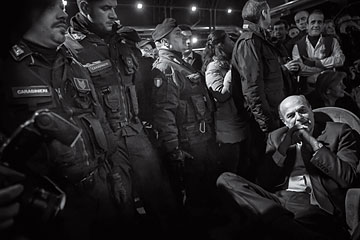
Bersani, bottom right, will need to hold together a center-left coalition to govern in Italy
(2 of 2)
The minister who introduced the reform was Bersani. Serving in five different center-left governments from 1996 to 2008, he led initiatives to slash bureaucracy and encourage competition in the energy market, insurance, retail and banking industries. These initiatives, collectively known as Bersani decrees, earned their author a reputation as a champion of liberalization — and an unlikely one. The son of a gas-station owner in the small town of Bettola, southeast of Milan, Bersani organized his first strike as an altar boy, persuading his parish priest to distribute the tips left during baptisms and weddings. In 1975 he won election to the town council as a member of the Italian Communist Party.
But Bersani's track record as a minister buoys expectations that he will continue the restructuring required to restore Italy to health. Italian manufacturers are in trouble — China and other emerging economies can increasingly achieve Italian quality without Italian costs. Already overburdened with high pensions and tangled in red tape, Italy's entry into the euro zone in 1999 ended its status as a cheap place to make things. These days its economy is an eerie mirror of the euro zone's, with wealth concentrated in the north, generated by small and medium-size enterprises, and the south characterized by a bloated state sector.
That bloat should be an obvious target for a reform-minded Prime Minister, but in conversation with TIME, Bersani proves coy on the subject of future cutbacks, specifying only Italy's acquisition of the F-35 Joint Strike Fighter as a possible casualty. "There are also areas where we don't spend enough," he says. "We're in a recession, but spending on welfare has gone down."
Mixed messaging is in part the price of the coalitions that are the result of an electoral system designed in the rubble of Benito Mussolini's regime to prevent any one individual or party from attaining too much power. That it does not always do so is proved not only by the success of Berlusconi, whose political power is under-pinned by his ownership of a sizable chunk of the Italian media. From 1946 to '92, the Christian Democrat Party and its allies won every single election, with the support of the Catholic Church and others determined to keep communism at bay. In 1994, after a series of scandals had laid bare the corruption of five decades of unchallenged rule, it disbanded and the left believed its moment had come. Instead Berlusconi snatched his first victory.
Since then, Italian politics has been organized on a simple principle in place of right vs. left: for and against Berlusconi. The picture looks more complex because of the sheer number of shifting political coalitions that must satisfy broad ranges of views. Bersani's center-left coalition consists of four parties and relies on the support of the country's big labor unions. Split between the reform-minded and the more traditionally leftist, it's not an easy fit. "The center-left has two souls, and they will be struggling," says Pietro Ichino, a politician who left the Democratic Party for Monti's coalition of reformists in December.
Berlusconi's bloc is gaining popularity as he promises to splurge rather than cut, for example, pledging to overturn, and even refund, a housing tax put in place by Monti. These gains may prevent Bersani from securing a working majority for his coalition, pushing him to seek Monti's help. That prospect pleases the proponents of further reform; but far from ensuring Italy's recovery, it could also be a recipe for weak, gridlocked government. An alliance with Monti might force Bersani to water down the socially progressive stances that unite the center left. But keeping the traditional left on board could require Bersani to stifle some of his free-market zeal. That balancing act may not leave much room for action, but Bersani insists that his priorities are clear and achievable. "My first order of the day will be civic renewal, morality and the reform of politics," he says.
The last of these ambitions is clearly the greatest. The current election campaign, a strange confection of shadow-boxing and comedy candidates, is merely the latest episode in Italy's narrative of political dysfunction. As Bersani sidesteps hard-edged policy promises to avoid rifts in his coalition, he undermines his credentials as a man ready to tell Italians hard truths. The evidence of Bersani's time in office suggests he is a politician who uses power responsibly. But that will do him no good if he ends up with too little of it to make a dent in Italy's manifold problems.
Bersani recently gave one of his party's candidates a characteristically dour piece of advice. "Remember," he said, "that the political life of any man always finishes in disillusion." It seems likely that a Bersani government is about to begin that way. If given a large enough mandate, perhaps things will finish a little bit better.
